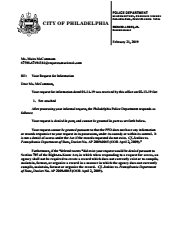Deleted Tweets on @PhillyPolice
| Submitted | Jan. 14, 2019 |
| Est. Completion | None |
MuckRock users can file, duplicate, track, and share public records requests like this one. Learn more.
Communications
From: Muira McCammon
To Whom It May Concern:
Pursuant to the Pennsylvania Right to Know Act, I hereby request the following records:
I request all agency records from September 2009 to the present concerning Tweets deleted or drafted and not sent from the @PhillyPolice account associated with Philadelphia Police Department.
I believe the records that I are located, inter alia, within agency headquarters, in email records, and in third-party platforms used to manage the Agency’s social media accounts.
The records I request include, but are not limited to:
1. Records of all tweets deleted by the Twitter handle associated with the Philadelphia Police Department’s @PhillyPolice including:
a. Any tweets that were published on Twitter and subsequently deleted for any reason; and
b. Any tweets published by other accounts that were retweeted by @PhillyPolice and subsequently deleted for any reason.
2. Records of all tweets that have been kept in draft form beyond their expected date and time of publication, on Twitter or in a third-party social media management platform, for any reason.
3. Records related to the drafting or deletion of tweets, including:
a. Any correspondence or record of correspondence regarding the drafting or deletion of specific tweets
i. including correspondence sent through official government email addresses or messaging services; and
ii. including correspondence sent through private third-party services such as Gmail or Slack; and
iii. Including any messages, notes, or annotations created on a third-party social media management platform.
b. Documentation of the agency’s existing policy regarding the preservation and maintenance of tweets
c. Any briefings, reports, memoranda, legal opinions, policy statements, or talking points used or disseminated within the Agency regarding the drafting or deletion of tweets.
I urge the Philadelphia Police Department to process this request consistent with “a general philosophy of full agency disclosure [under FOIA and RTK] unless information is exempted under clearly delineated statutory language,” United States Dep't of Def. v. Fed. Labor Relations Auth., 510 U.S. 487, 494 (1994), and the Justice Department’s policy directing a presumption of disclosure. See Dep’t of Justice Office of Information Policy, President Obama’s FOIA Memorandum and Attorney General Holder’s FOIA Guidelines: Creating a “New Era of Open Government” (2009), available at https://www.justice.gov/oip/blog/foia-post-2009-creating-new-era-open-government).
Request for Public Interest Fee Waiver
I request a waiver of fees because disclosure of the requested records is in the public interest. It “is likely to contribute significantly to the public understanding of the activities or operations of the government and is not primarily in the commercial interest of the requester.” 5 U.S.C. § 552(a)(4)(A)(iii).
First, the records concern the operations or activities of the government. Government social media accounts are used to disseminated information to the public, make official pronouncements, and generally serve as an important touch point for governments to receive public input. See Social Media Use by Governments: A Policy Primer to Discuss Trends, Identify Policy Opportunities and Guide Decision Makers, OECD Working Papers on Public Governance, available at https://dx.doi.org/10.1787/5jxrcmghmk0s-en. Social media use, including tweets posted by @PhillyPolice and then deleted, or never posted, is an important part of this activity.
Disclosure of the requested information is likely to contribute significantly to public understanding of the operations or activities of the government. Specifically, the requested records will reveal substantial new information about how the Philadelphia Police Department defines and manages tweets. They will allow the public to see what published messages have been rescinded and the process by which these public statements were retracted as compared to the processes employed by other agencies. For example, my research on the Twitter account of the Guantanamo Bay Naval Base revealed to the public that the account had systematically deleted controversial tweets. See Brady Dale, To What Extent is a Tweet a Federal Record?, TECHNICAL.LY BROOKLYN (October 24, 2017), (https://technical.ly/brooklyn/2017/10/24/muira-mccammon-talks-gitmo-radical-networks/).
Finally, the records are not primarily in my own commercial interest. I seek the requested information for newsgathering purposes, and expect to incorporate it into journalistic work product to be disseminated to the public, like those already produced. See Muira Mccammon, Trouble @JTFGTMO, SLATE (April 17, 2018), https://slate.com/technology/2018/04/why-did-the-joint-task-force-of-guantanamo-start-deleting-tweets.html; Muira Mccammon, Can They Really Delete That?, SLATE (April 17, 2018), https://slate.com/technology/2018/04/why-did-the-joint-task-force-of-guantanamo-start-deleting-tweets.html.
For the reasons above, I respectfully request that the Philadelphia Police Department grant a public interest fee waiver for this request, and that all fees related to the search, review, and duplication of the requested records be waived. If the fees will not be waived, I agree to pay up to $100 for the processing of this request. If the estimated fees will exceed this limit, please inform me before you begin processing.
Request for “News Media” Fee Status
As a freelance journalist, I am a representative of the news media and do not seek the records requested for commercial use. Therefore, if the agency does not find that my request meets the standards required for a public interest fee waiver, I request that fees associated with the processing of my request be limited to reasonable duplication costs. 5 U.S.C. § 552(a)(4)(A)(ii)(II).
I am a representative of the news media because I “gather[] information of potential interest to a segment of the public, use[] [my] editorial skills to turn the raw materials into a distinct work, and distribute[] that work to an audience.” Id. § 552(a)(4)(A)(ii)(II). I can “demonstrate a solid basis for expecting publication… by a… past publication record.” Id. § 552(a)(4)(A)(ii)(II).
My work has been featured in publications including Slate, VICE, the Massachusetts Review, Kill Screen, and more. I have previously requested documents obtained via FOIA from a range of federal agencies and government officials regarding the deletion of tweets from official Twitter accounts. I used that information to write a series of articles outlining both how individual agencies decided whether or not to delete tweets and more broadly how the government regards Twitter statements. These articles have been published, disseminated, and further reported upon to a broad audience. See Muira Mccammon, Trouble @JTFGTMO, SLATE (April 17, 2018), https://slate.com/technology/2018/04/why-did-the-joint-task-force-of-guantanamo-start-deleting-tweets.html; Muira Mccammon, Can They Really Delete That?, SLATE (April 17, 2018), https://slate.com/technology/2018/04/why-did-the-joint-task-force-of-guantanamo-start-deleting-tweets.html..
Therefore, if this request is not classified as being in the public interest, I respectfully request to be classified as a “news media” requester for purposes of fee assessments.
I request that responsive electronic records be provided electronically in their native file format, if possible.
Thank you in advance for your anticipated cooperation in this matter.
I look forward to receiving your response to this request within 20 days.
Sincerely,
Muira McCammon
From: Muckrock Staff
To Whom It May Concern:
I wanted to follow up on the following Pennsylvania Right to Know Act request, copied below, and originally submitted on Jan. 14, 2019. Please let me know when I can expect to receive a response.
Thanks for your help, and let me know if further clarification is needed.
From: Muckrock Staff
To Whom It May Concern:
I wanted to follow up on the following Pennsylvania Right to Know Act request, copied below, and originally submitted on Jan. 14, 2019. Please let me know when I can expect to receive a response.
Thanks for your help, and let me know if further clarification is needed.
From: Muckrock Staff
To Whom It May Concern:
I wanted to follow up on the following Pennsylvania Right to Know Act request, copied below, and originally submitted on Jan. 14, 2019. Please let me know when I can expect to receive a response.
Thanks for your help, and let me know if further clarification is needed.
From: Philadelphia Police Department
Ms. McCammon :
Attached to this correspondence is the Philadelphia Police Department's final determination to your request for information.
Best :
Philadelphia Police Department
Open Records/Right-to-Know Section
750 Race Street, Rm. 203
Philadelphia, PA 19106
Files
pages

